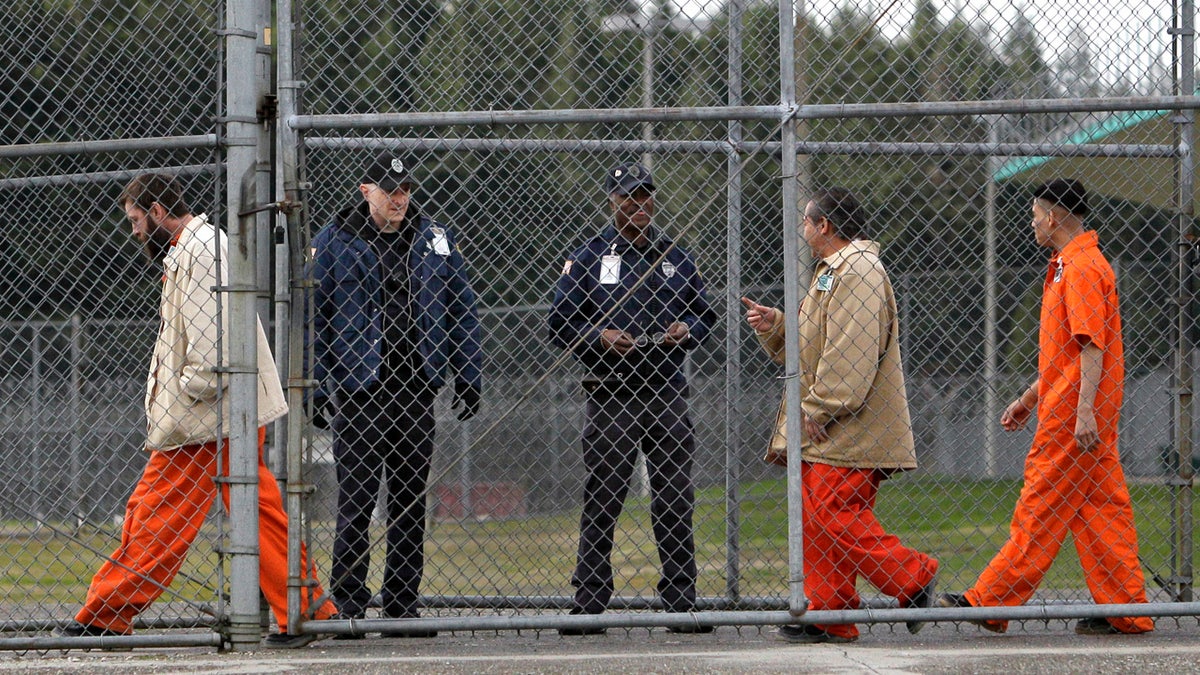
FILE - In this Feb. 17, 2011 file photo, inmates walk past correctional officers at the Washington Corrections Center in Shelton, Wash. Gov. Jay Inslee said Tuesday, Dec. 22, 2015 that more than 3,000 prisoners in Washington have been mistakenly released early since 2002 because of an error by the state's Department of Corrections. (AP Photo/Elaine Thompson, file)
OLYMPIA, Wash. – At least three Washington state prisoners released early because of a computer error committed crimes during the time they should have been behind bars, state officials said Thursday.
During a conference call with reporters, officials from the Department of Corrections said the three are among 27 others who have been released since June and potentially need to be arrested and returned to prison because of an error the agency made on calculating sentences.
Officials could not say whether those prisoners have yet been re-arrested. They also didn't release specific information on the new crimes, saying they were working to confirm the information.
Earlier this week, Gov. Jay Inslee said that he ordered immediate steps to correct software-coding error that has led to as many as 3,200 offenders being wrongly released early since 2002.
Five prisoners released in error since June have already been re-incarcerated. Another 3,000 who are still incarcerated also had inaccurate release dates. Officials have said most of the errors were 100 days or less. In some cases, inmates were released just a few days early, but at least one person who is still incarcerated had a release date that was off by about 600 days.
"We're casting a wide net and doing extensive reviews of each case," Corrections Secretary Dan Pacholke said Thursday.
Pacholke said that once they have all of the information they need, they will prioritize expediting the arrests of those who committed new crimes. He noted that on average, about 10.5 percent of inmates who are released from prison commit a crime within the first year of their release.
"This group will probably be comparable to that overall statistic," he said.
The mistake came following a July 2002 state Supreme Court ruling that required the Department of Corrections to apply good-behavior credits earned in county jail to state prison sentences. However, the programming fix ended up giving prisoners with sentencing enhancements too much so-called good time credit.
Sentencing enhancements include additional time given for certain crimes, like those using firearms or those committed near schools. Under state law, prisoners who get extra time for sentencing enhancements cannot have that time reduced for good behavior.
Based on another Supreme Court ruling that credits time out to the sentence of prisoners who have been mistakenly released early, most of the affected offenders won't have to go back to prison.
The Department of Corrections was first alerted to the error in December 2012, when a victim's family learned of a prisoner's imminent release. The family did its own calculations and found he was being credited with too much time.
However, even though the agency consulted with attorneys regarding the error the same month and scheduled a fix for the program, it was repeatedly delayed and ultimately, never done. Pacholke said he didn't learn of the error until last week, and the governor says he didn't learn of the issue until that same time, when corrections' officials notified his staff.
Inslee has told corrections officials to stop releasing prisoners affected by the glitch until a hand calculation is done to ensure the offender is being released on the correct date. A broad fix to the software problem is expected to be in place by early January.
Two retired federal prosecutors have been brought in to conduct an independent investigation to determine why the error occurred and went unfixed for more than 13 years.

